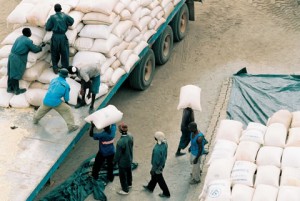By David Stevenson
As investors begin to re-engage with risky assets, such as emerging market equities, it is fascinating to watch the slow rekindling of interest in Africa.
Late in 2008, the wheels came off the “decoupled, uncorrelated markets” thesis, which had suggested that frontier markets were uncorrelated with developed world stock markets and powered instead by domestic growth. In reality, supposedly inflation-proof commodity-based “hard” assets turned out to be hugely correlated with global economic confidence and appetite for equity risk. So, when demand fell, African mines started closing at a brisk pace. Everyone quickly dumped their frontier market assets.
But hard assets are back in, partly inspired by China’s seemingly irresistible demand and partly by growing concern for future inflationary prospects. Prices continue to wobble, but those suggesting another savage round of price falls are beginning to look an increasingly lonely bunch. Also, population growth continues its remorseless rise, wreaking havoc on food chains.
Africa has plenty of resources and land – and, judging by an excellent Economist feature (Buying farmland abroad – outsourcing’s third wave, May 21, 2009) on sovereign wealth funds buying up tracts of Sudan, African agriculture remains a very long-term bet for the adventurous investor.
However, there is still the issue of how to access the various discrete “Africa” stories – resources, agriculture and the growing middle class.
I’ve already written about the Africa Opportunities Fund (AOF) on the Alternative Investment Market (Aim), which I’ve continued to buy into, albeit slowly. Its most recent report said: “The fixed-income portfolio is valued at 45 per cent of par value and has a 23 per cent current yield. The equity portfolio is comprised primarily of companies with a single-digit price/earnings ratio and double-digit dividend yield. The portfolio overall is generating approximately a 15 per cent cash yield.” Value investors, please take note.
A diversified fund such as this is probably the safe route into Africa but there are alternatives. You could buy into a diversified multinational that is buying up assets across the continent, such as Lonrho. Or you could look at individual African businesses that are quoted on Aim and give exposure to a specific theme.
For example, Camec, the Aim-quoted copper and cobalt mining company, has spun off two London-listed businesses: AgriTerra (ticker symbol: AGTA) and African Medical Investments (AMEI).
AgriTerra is arguably the more interesting of the two. It made its market debut last year. While sovereign wealth funds have been buying up tracts of land, AgriTerra has been taking a different tack. It has avoided the thorny political issue of buying land and concentrated instead on acting as a middleman, buying up maize from small farmers in Mozambique and then processing and selling it. Its customers include the World Food Programme.
Having invested more than $40m on its existing profitable plant, the company is now rolling out another mill in Mozambique and looking to expand its processing operations in other African countries. This is where Camec’s expertise in trucking-based logistics operations should pay off. At its current share price of 3.5p, AgriTerra is valued at £17m, which is not cheap. But if its managers can scale up and build a network across the southern half of the continent, the value of AgriTerra to a bigger food processing conglomerate could be huge.
African Medical Investments is a play on the growing demand for specialist, high-quality private healthcare. It is built on solid foundations: an outfit providing airport clinics and a fast-growing trauma clinics business that’s up and running in Tanzania’s Dar Es Salaam and soon to be rolled out to Maputo in Mozambique.
African Medical is all about deploying large amounts of upfront capital on the ground in to build a leading position in a sector that would be regarded as mainstream in the developed world. Food processing and private hospitals are regarded as a fairly boring play in the UK but very few people have committed the resources to these sectors in Africa and thus you can quite quickly build a first-mover advantage.
Of course, the risk is that that first-mover advantage will amount to nothing if political chaos erupts – but that’s the investment argument here: in Mozambique, Tanzania and Uganda, political risk is slowly being taken off the table. So, if African Medical achieves strong growth, it’ll probably be snapped up by a bigger outfit looking to expand its hospital network into Africa.
So, AgriTerra and African Medical are essentially private equity assets that happen to be listed. I’d also love to see Camec’s logistics operation hived off. Unlike Lonrho, neither offer any built-in diversification. Even so, for the adventurous investor who wants to build a long- term position in Africa, these discrete trading businesses represent a bolder bet on the continent’s future.












